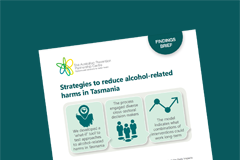Strategies to reduce alcohol-related harms in Tasmania
Alcohol-related harm is a complex, wicked problem. This project developed a ‘what-if’ tool to test the likely impacts over time of a range of policies and programs to reduce alcohol-related harms in Tasmania.
Key messages
- We have developed a dynamic simulation model that serves as a ‘what-if’ tool to test the likely impacts over time of a range of policies and programs to reduce alcohol-related harms in Tasmania.
- The model provides a logically consistent framework that integrates best available evidence, data and expert knowledge.
- The model may assist policy makers and program planners, as part of a suite of considerations, in determining what combinations of interventions could achieve both short-term (acute) and longer-term (chronic) reductions in alcohol-related harms.
- Using a participatory process to develop the model meant we were able to engage stakeholders across many sectors in Tasmania who are central to decision-making about alcohol-related harms.
- Broad policy responses to alcohol harms, such as reducing the availability of alcohol, can have a larger impact than a health sector response alone.

